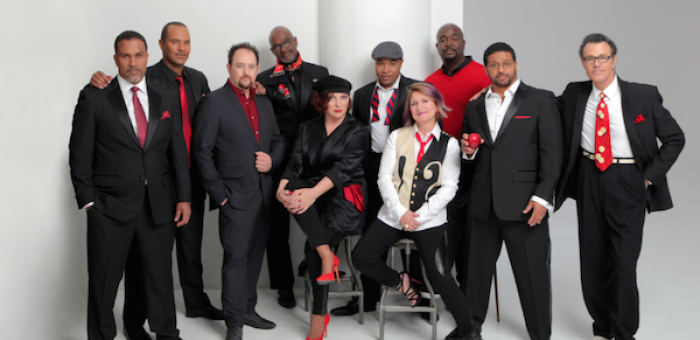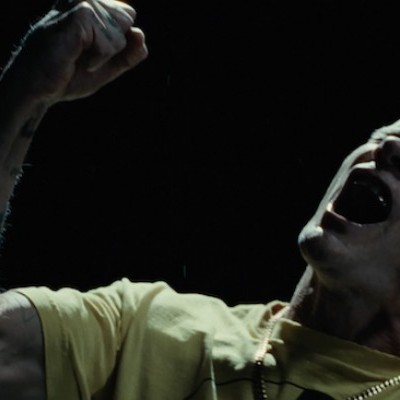Dec 9, 2025 12:28 PM
In Memoriam: Gordon Goodwin, 1954–2025
Gordon Goodwin, an award-winning saxophonist, pianist, bandleader, composer and arranger, died Dec. 8 in Los Angeles.…

The members of The Manhattan Transfer and Take 6 performed together in Nashville on Oct. 19.
(Photo: Courtesy of the artists)Nashville’s City Winery epitomizes the confluence of sleek sophistication and down-home soul that defines the current local culture. Low lighting, chic wood floors, gourmet dining with a funky touch—it is the visionary and culinary equivalent of the city’s hometown vocal heroes, the a cappella group Take 6.
At 7 p.m. on Oct. 19, the group members walked onstage from opposite wings to begin one hour and 22 minutes of bliss for all connoisseurs of vocal jazz harmony. Impeccably dressed in suits and ties, the group opened with Alvin Chea vocalizing a medium-tempo walking bass line studded by percussive accents. One by one, his colleagues joined in with wordless improvised lines that gradually assembled into the Benny Golson classic “Killer Joe.”
The group riffed on this groove for another minute or so, and then three of the members strolled to the far side of the stage, still performing through handheld mics. While snapping their fingers to the backbeat, the members of Take 6 reconfigured themselves into two lines, forming a perfect runway.
Enter famed vocal unit The Manhattan Transfer, who, to the audience’s delight, paraded through the two lines. With everyone now snapping and swaying as one, TMT singer Janis Siegel stepped forward to scat a couple of choruses. As she finished, one of the Take 6 members took the next solo, and so the two outfits alternated in a joyful competition that ended with TMT’s Trist Curless unleashing a head-spinning bebop line that left Chea shrugging and smiling.
The vibe established in this first song warmed and deepened as the night went on. The two groups appeared individually, together and in fluid combinations, including a re-creation of The Manhattan Transfer’s four-voice arrangement of “A Nightingale Sang In Berkeley Square,” which united Siegel and Cheryl Bentyne with two of the Take 6ers. (“We don’t usually get to sing with girls,” quipped tenor Claude V. McKnight III.)
Respect, affection and a fondness for teasing their opposites defined the interactions between both groups. After a unified romp through the Transfer’s 1979 hit “Twilight Zone/Twilight Tone,” Siegel gushed with mock-girlish adulation, “We’ve been fans of Take 6 since we were small, really small children.”
Later, McKnight returned the “compliment” by noting that they had chosen vintage vocal mics for the show to make their colleagues feel more at home. And during a duel on “Route 66,” each group faced and advanced on the other. (Think West Side Story’s “Dance At The Gym,” except the Jets and the Sharks are best friends).
Polished choreography was an important element of the show. All the singers flashed synchronized thumb-pinky phone hands on the gospel roof-raiser “Operator.” Several members of Take 6 played air trombone while emulating low brass backup parts behind Mark Kibble’s spirited vocal on “I’ve Got Life.”
Then, as they segued into “Spread Love” and Kibble led the audience in an ecstatic call and response, his cohorts slipped behind him into an impeccable step. Their flawless visual and musical execution—and the exuberance emanating from each turn and slide—sparked the first of several standing ovations.
Now and then the audience joined in on the act. Following the Transfer’s gorgeous rendition of “Candy,” from their 1975 eponymous debut album, Alan Paul flashed a surprised grin and stepped to the edge of the stage, where someone handed up to him the cover of that very LP. As he showed it off to the room, Bentyne observed drolly, “We haven’t changed a bit!”
While many of the tunes were rendered a cappella, Manhattan Transfer’s band entered frequently as needed. Pianist/music director Yaron Gershovsky played several solos, beginning each one with parallel single lines in the left and right hands and then building into fully chorded, post-bop invention.
The backing musicians grew more crucial as the show built toward the finale. When Gershovsky, bassist Wayne Batchelor and drummer Ross Johnson dove into the Transfer’s arrangement of “Birdland,” it felt like Johnson was wavering between straight and swing nuances.
Encoring with “What’d I Say,” the whole assembly of singers flashed “hitch-hike” thumbs to the lyric “Gonna send you back to Arkansas,” shook their “things” when cued by those lyrics and locked down a groove that, for this writer, still hasn’t quit.

Goodwin was one of the most acclaimed, successful and influential jazz musicians of his generation.
Dec 9, 2025 12:28 PM
Gordon Goodwin, an award-winning saxophonist, pianist, bandleader, composer and arranger, died Dec. 8 in Los Angeles.…

Belá Fleck during an interview with Fredrika Whitfield on CNN.
Jan 13, 2026 2:09 PM
The fallout from the renaming of the John F. Kennedy Center for the Performing Arts to include President Donald…

The success of Oregon’s first album, 1971’s Music Of Another Present Era, allowed Towner to establish a solo career.
Jan 19, 2026 5:02 PM
Ralph Towner, a guitarist and composer who blended multiple genres, including jazz — and throughout them all remained…

Flea has returned to his first instrument — the trumpet — and assembled a dream band of jazz musicians to record a new album.
Dec 2, 2025 2:01 AM
After a nearly five-decade career as one of his generation’s defining rock bassists, Flea has returned to his first…

Rico’s Anti-Microbial Instrument Swab
Jan 19, 2026 2:48 PM
With this year’s NAMM Show right around the corner, we can look forward to plenty of new and innovative instruments…